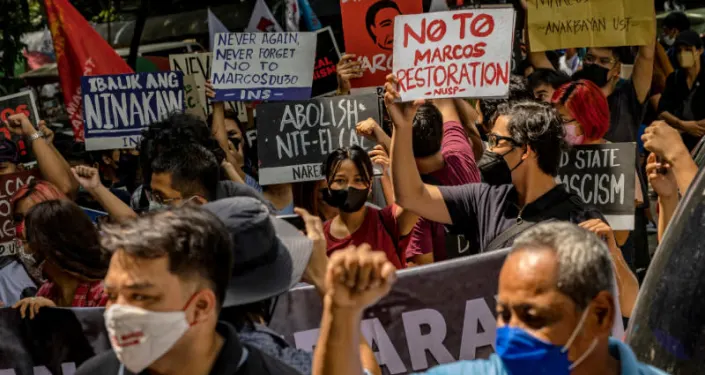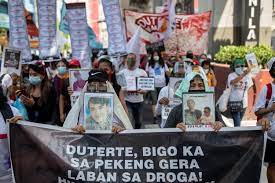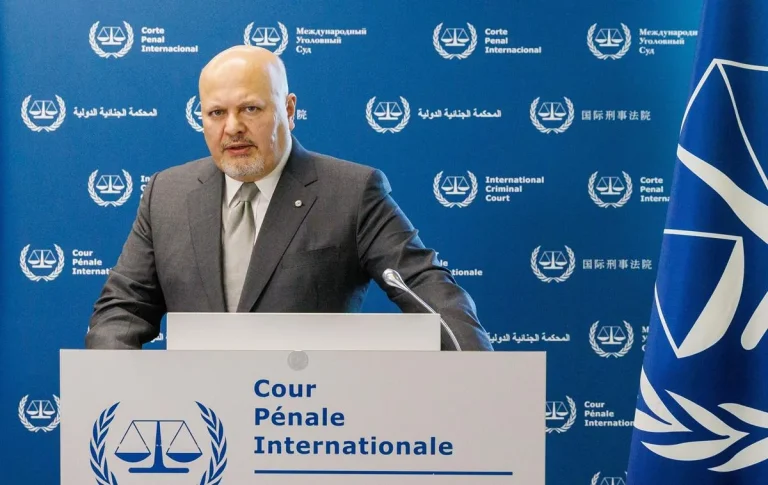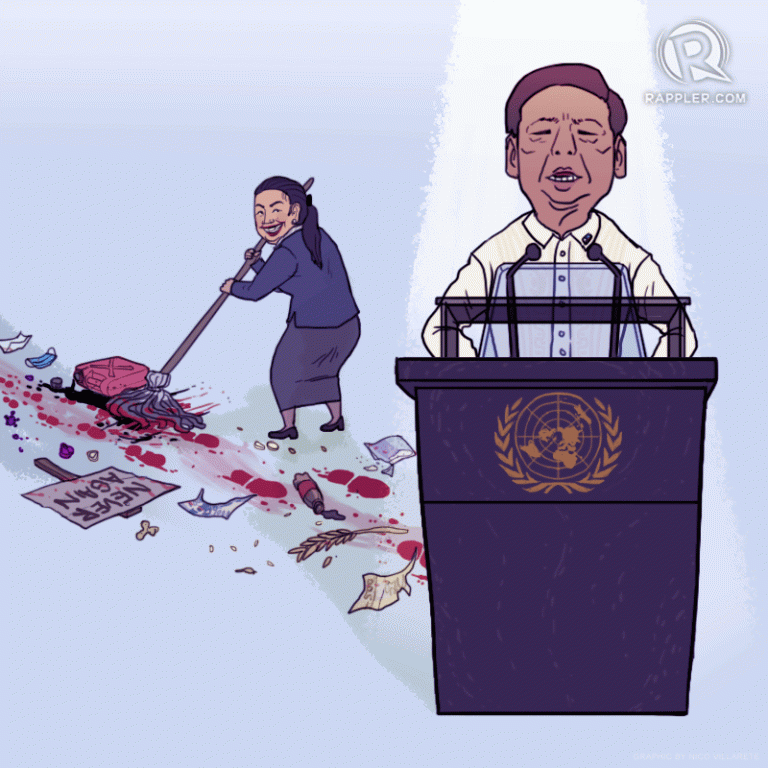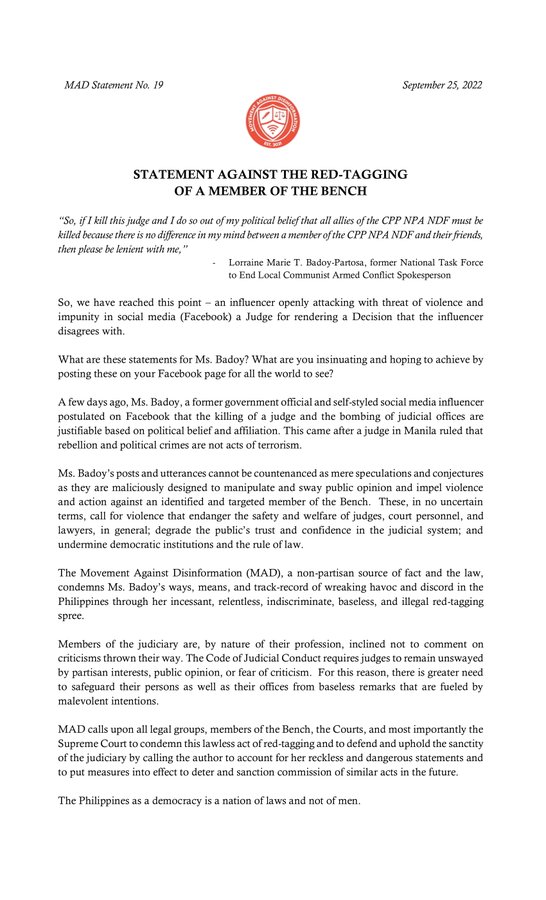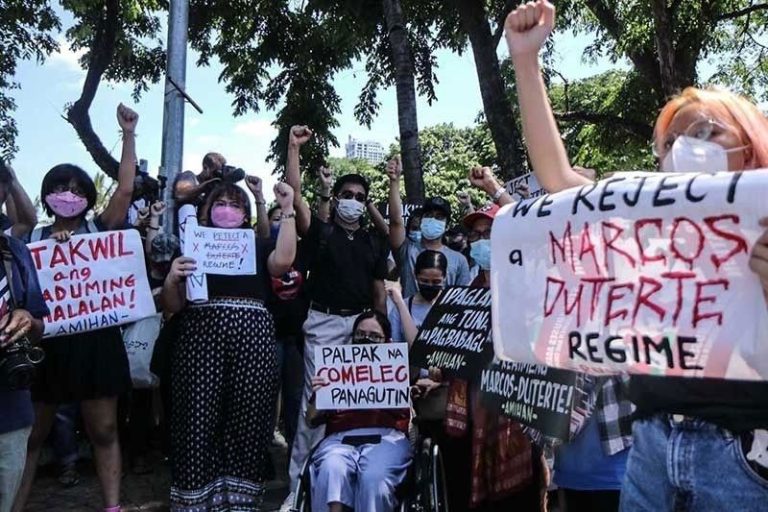by E. San Juan, Jr.
Philippines Studies Center, Washington DC
IN his classic “The Eighteenth Brumaire of Louis Bonaparte,” Karl Marx amends Hegel’s quip on history repeating itself, first as tragedy and then as farce (1986 97). With the former Philippine dictator Marcos’s son in office, will farcical acts be the spectacle for the next six years?. Imagine the sons of Somoza, Trujillo or Batista returning to their banana republics—that would indeed be “the tradition of all the dead generations” acting as toxic “nightmare on the brain of the living.”
The oldest U.S. neocolony, the Philippines, was plundered and ruined by Ferdinand Marcos from 1966 to 1986. Biding their time in Hawaii, a refuge offered by the colonizers, the Marcos dynasty staged a comeback with their wealth and retinue of factotums intact. They consolidated power in their localities (Ilocos, Leyte) and began a program of selective retrieval. Aided by consumerist amnesia and a new generation bereft of historical knowledge, they inched their way to governorship and congressional seats. Amid widespread vote-buying and fixing of the Smartmatic computerized machines in the May 2022 elections, Marcos Jr., known as “Bongbong,” was installed as president (CENPEG 2022). They struck a bargain with strongman Duterte by allowing the daughter Sara to run as vice-president to safeguard the father from any criminal investigation after his tenure.
Despite some citizen-groups’ protests and media demands to review the election results by the Duterte-controlled Commission on Elections, nothing was done to block Bongbong’s proclamation. The corrupted State ideological apparatuses to pacify class conflicts (legislature, courts, police, military bureaucracy) had already been eviscerated. The farce seems to be the consensus of the oligarchic clans—Arroyo, Estrada, Duterte, Marcos, billionaire Chinoy networks—with huge funding by corporate interests, religious, and military blocs that have so far benefited from their rule.
Estranging Affinities
The Marcos dynasty has so far successfully defied all court verdicts since their return from Hawaii in 1992. Bongbong himself refused to pay back-taxes while his mother, Imelda Marcos, sentenced to jail a while ago, remains free to flaunt her wealth—not her fabled thousand shoes, but the dynasty’s “past glory” reconfirmed by Marcos’ burial in the cemetery of heroes by Duterte. The elaborate State funeral was the ritual designed to repair the frayed social cohesion that is somehow ascribed to the Aquino clan represented by the “pink party” of the Liberal Party (Roxas clan) and the defeated candidate Leni Robredo. A compromise was reached with the Duterte bloc, compensating for Bongbong’s frustrated vice-presidential ambition in 2016.
Meanwile, Bongbong’s sister Senator Imee Marcos devised another farcical strategy. To reinforce the Cambridge Analytica/Google handling of the Marcos “brand” in social media, She financed a film entitled “Maid in Malacanang” to revise the spectacle of the family’s 1968 panicked escape from the palace as the infuriated masses smashed the gates and soon occupied the dictator’s sanctuary. It was a desperate attempt to alter the media discourse on the impact of the people’s anger and repudiation of the patriarch’s martial law (1972-1986) and its horrors. Somehow, the tragic show needs comedic retouching.
For many reviewers, Imee’s propaganda ploy was an abject failure. Rappler, the news outfit headed by Maria Ressa, recent Nobel Prize winner, fact-checked the film’s truthfulness by comparing it with the book by Arturo Aruiza, Marcos’s military aide. Rappler testified to the film’s disingenuous erasure of Marcos’ failure to squelch the Ramos-Enrile mutiny which sparked the EDSA “People Power” insurrection (Tequero 2022). Instead of showing the mayhem overtaking the household, the film depicts Imee fully in charge of what was going on. She was jefe con cojones.
The film depicted Imee displacing the regular staff and projecting herself as her father’s trusted manager—the real heir to his prestige, authority, intelligence. Affinities eclipsed alienating divisions. Deconstruction of conventional gender-role and class-subordination, however, produced the opposite: glamorizing the new androgynous Imee as unifying official/managerial elite, marginalizing Bongbong and vindicating the patron-client reciprocity—the supreme Filipino value, as mainstream academics assure us.
Imee’s cinematic role (“pinakamahusay na katulong”) with Marcos’ blessing—:”my darling genius of a girl”—seeks to salvage the eroded dignity/power of the dictator. Marcos was emasculated with physical disabilities that constrained patriarchal hubris. In its absence, Imee shed off whatever feminine mystique she had and took over the refurbishment of the damaged Marcos “brand” by role-switching and re-identifying her lot with the loyal subaltern-proletarian cohort. It’s difficult, however, to insinuate the EDSA crowd into the film, given its association with the Aquinos as persecutors.
We can not yet fully assess the impact of this farcical episode.The latest news is that embassies abroad have been ordered to propagate the film. While Imee’s concoction opened to much fanfare, another film entitled KATIPS about anti-Marcos activists and rebellious youth who fought the dictatorship attracted more attention and sympathy. We predict more farcical offerings to cement the widening fissures of the neocolonial structure established by more than a century of U.S. military, economic and cultural domination since the Filipino-American War (1899-1913; see San Juan 2021)..
The Gossip-Master Intervenes
Historian Ambeth Ocampo noted the film’s “twisted retelling of history,” but was more vexed by the director’s “artistic license,” as illustrated by the attempt to smear Cory Aquino by depicting her as “playing mahjong with Carmelite nuns when the fate of the nation hung in a balance. ” Ocampo adds that “the suppressed Marcos narrative provided by Imee Marcos is that the Marcoses were driven from Malacanang by fair weather friends who looked down on them for their provincial and nonelitist origins” (2022).
In short, “Maid in Malcanang” is a gambit to cast the Marcos dynasty as victims deserving empathy, and in fact becoming the uncanny exemplars of the nationalist movement. Contrary to the view that Imee’s vanity film hopes to exude a humanist appeal, its drawing-power are the female stars who supposedly can seduce thousands of fans and devotees on behalf of the oligarchs. Again, the irony traps Imee/dynasty’s effort to recapture the aura of the pre-Marcos image: Malacanang cannot be recast into a slumdweller or peasant-farmer’s residence. Nor can the fashionably-attired Imee mimick the harried servant-maid obsequiously following orders. Just about the same time the film grabbed headlines, the capture of a much-abused political activist, Adora Faye de Vera, was announced by the metropolitan police.
Spoiling the Polemical Opera
De Vera, 68 years old, was arrested last August 26 for alleged involvement in “multiple murder, with the use of explosives and antipersonnel mine.” She was first arrested for pasting anti-government posters in October 1976 and sexually abused and tortured by the military until June 1977. Parts of her body were burned, toenails and fingers crushed, remaining naked for some time; and she was repeatedly raped. The responsible culprits—eleven soldiers and three civilians—were members of the Military Intelligence Group, 2nd Constabulary Security Unit, 231 PC Company of Quezon Province (Martial Law Files 2012). Specifically, the torturers responsible belong to the Philippine Constabulary under General Fidel Ramos, together with the Ground Team 205 of 2nd Military Intelligence Group, AFP, which counts Col. Alejandro Gallido, Corporal Alberto Trapal, Corporal Charlie Tolopia, Capt. Eduardo Sebastian, Capt Jesus Calaunan, Lt. Joseph Malilay, and assorted civilian accessories (Ilagan 2019, 24-26).
After repeated sexual assaults, De Vera got pregnant and had to induce an abortion. Her husband Manuel disappeared 22 years ago and has remained a desaparecido to this day.Together with De Vera were Rolando Federis and Flora Coronacion who were raped by 14 men numerous times; after their torture, they performed the official roles of “desaparecidos” in the State’s theater of predatory entertainment.
It is publicly known that Filipino military officers since then—from Marcos to Duterte’s regime—have been notorious for relentless rapacity and barbarism. This seems to be their claim for manly distinction ever since the U.S. established the Philippine Scouts to assist their bloody suppression of Filipinos refusing McKinley’s “Benevolent Assimilation.” The PC (now the PNP/Philippine National Police) was then headed by the late General Fidel Ramos. Just like Duterte’s death-squad, none of the torturers had been charged (Melencio 1998). All in all, twenty security men were involved in this documented outrage against De Vera, Morales, and Coronacion.
De Vera’s second arrest occurred in October 23, 1983 during a military encirclement in Bicol province. She was then 30 years old, married with two children. She was shot in the leg. Since her imprisonment in 1976 up to now, De Vera has been suffering from her traumatic encounter with the police and officers of the Armed Forces of the Philippines (Varona 2022). Arrested in Metro Manila, she has been flown to a jail in Iloilo City, where more farcical events are sure to be witnessed.
Cry of the Multitude
De Vera is only one of the thousands of political prisoners who suffered the vicious depravity of the Marcos martial-law regime. Amnesty International and other human-rights observers have documented 3,275 killed, 35,000 tortured, and 70,000 incarcerated persons during the Marcos dictatorship….Some 2,520 Filipinos were ‘salvaged’—that is, tortured, mutilated and dumped on a roadside for public display” (McCoy 2001) KARAPATAN and the Major Religious Superiors of the Philippines have preserved records of the human-rights abuses of the Marcos years.
For lack of space, I can only cite here the case of Maria Cristina Rodriguez, one of the thousands of victims of the Marcos “conjugal dictatorship.” Rodriguez is now the executive director of Bantayog ng mga Bayani (Monument to Heroes), a museum for martial-law victims. In a public testimony dated September 8, 2016, as requested by the Supreme Court concerning the Duterte regime’s plan to bury Marcos in the nations cemetery for heroes, Rodriguez recounted her ordeal. Here is an excerpt:
Yes, Marcos soldiers tortured and abused me. I saw others as well, a boy screaming from zaps of electric torture, a friend with polio beaten black and blue, a man with both feet bandaged because a military officer had pressed them with red-hot iron during interrogation…My godmother was killed by intelligence agents inside a hospital room. I’ve talked with mothers whose son or daughter was shot pointblank by men in uniform. I’ve myself documented hundreds of cases of Filipinos who underwent varying levels of inhuman treatment from the Marcos dictatorship—farmers executed, pregnant women raped, children massacred” (quoted in Beltran 2022).
The return of the Marcos dynasty to power—surely not as maid-servants glamorized by Imee Marcos—signals a revanchist move to revamp the narrative of the February 1986 debacle. For the Marcos loyalists, history may just be “tsimis” or gossip. But they take it seriously. One sign is the attempt to abolish the Presidential Committee on Good Government (PCGG) tasked to recover Marcos’ stolen wealth amounting to billions of dollars. Another is the move to sustain Duterte’s withdrawal of the country from the sway of the International Criminal Court which has been pursuing cases filed by many victims of Duterte’s drug-war since he assumed office as mayor of Davao City (1988-98). Duterte admitted complicity with deathsquads in 2015. He boasted wanting to kill 100,000 people before the end of his presidency. Over 30,000 victims of extrajudicial killlings under Duterte’s watch have been recorded, though only about 1,400 have been reported by the national police. Exhumations of the hundreds of slain “drug suspects” and autopsies are being processed to determine the authenticity of police records.
Political Prisoners Galore
The rampant practice of stigmatizing anyone critical of government policies as “terrorists” began with Cory Aquino and worsened with Duterte’s red-tagging policy.
Any dissenter is tagged as a “terrorist” supporter of the Communist Party of the Philippines and the New People’s Army. This originated with Sec. Colin Powell’s declaration in 2001 of the two groups as “terrorist” organizations. Under Duterte’s rule, the number of political prisoners ballooned to 592. Compare the number of detainees under President Arroyo (343) and under Benigno Aquino Jr. (306). This was before “Bloody Sunday, March 7, 2021, when Duterte’s police killed nine union workers and arrested six—all justified by his “shoot-to-kill” style of eradicating those he had already judged guilty (Bolledo 2022; ABS-CBN 2015).
With continued imposition of arbitrary arrests, rabid witch-hunting of branded “reds,” and subservience of the courts and legislature to the diktat of Marcos-Duterte, the already congested prisons—ghettoes of poor farmers, workers, and unemployed—promise more misery and deaths of hundreds of innocent citizens who thought they had the Bill of Rights and other constitutionally-mandated liberties.
As of June 22, 2022, the total number of political prisoners—critics of the regime arrested with guns and grenades planted on them—was 803. Among the most deprived and penalized are women, dating back to the time of De Vera and Rodriguez. In 2010, I discussed the plight of fifteen political prisoners who count among the most dehumanized (San Juan 2010) and campaigned for their release.
According to KARAPATAN, the most trusted human-rights monitor in the Philippines, there were 126 woman prisoners in March 2021, the majority of whom are charged for being associated with dissidents labeled “terrorists.” Many are human rights defenders, activists involved in helping workers, urban squatters, indigenous communities. Because they work for the deprived sectors, they are accused of being supporters of the terrorist insurgents to justify their illegal arrest and continuing detention in horrible quarters. They are presumed innocent until proven guilty—a principle rejected by the “justice” system in the Philippines. They are punished for trumped-up charges; some have been released after a long expensive appeal.
We appeal to the global community to demand the immediate release of the following political detainees who have already borne the brunt of State terrorism and cruelty:
1. Amanda Socorro Lacaba Echanis, a peasant organizer of Amihan National Federation of Woman. She just gave birth to her baby Randall Emmanuel when she was arrested on Decenmber 2, 2020. At 5AM, soldiers broke into the farmer’s house she was staying in, pointed guns at her and her 2-month old infant; the soldiers could not produce any search warrant, harassed and tormented her and later claimed they found firearms and explosives.
2. Raina Mae Nasino, organizer for KADAMAY, Manila. Nasino was arrested with two other activists on November 5, 2019. She gave birth to Baby River on July 1, 2020. After two months, jail authorities separated mother and child. Her baby died on October 9, 2020, only three months old. The distraught Nasino was granted furlough for only 6 hours to attend her baby’s wake and internment, while suffering from COVID-19 symptoms for which no medical help was provided by prison authorities.
3. Karina Mae dela Cerna,NNARA-Youth’s Nationall Deputy Secretary-General. Dela Cerna was arrested with 51 other persons in Bacolod City in the Bagong Alyansang Makabayan Office. Trumped-up charges were filed due to the discovery of firearms and explosives in the surrounding area.
4. Myles Cantal Albasin, fomer chair of Anakbayan, Cebu. Albasin was arrested wth five other youth from Negros Oriental where she was participating in community immersion with the farmers. Soldiers alleged that she engaged with them in a firefight, a claim disputed by residents of the area.
5. Renalyn Gomez Tejero, paralegal aid for KARAPATAN, Caraga. She was arrested on trumped-up charges of murder in Butuan City, Agusan del Norte, on March 21, 2021.
KARAPATAN has been in the government list of “communist fronts.”
6. Alma Moran, member of the secretariat of Manila Workers Union. Moran was arrested together with Reina Mae Nasino and Ram Carlo Bautista in a BAYAN office in Tondo, Manila. in November 5, 2019. After a second search of the office, the police claimed to have found firearms and explosives—the usual modus operandi.
7. Frenchie Mae Cumpio, journalist for Eastern Vista. Cumpio was arrested in Tacloban City on February 8, 2020. Police claimed to have found a pistol and grenade inside the room where she and a companion were staying. With the money confiscated upon their arrest, Cumpio and lay worker Mariel Domequil also face trumped-up charges of terrorist financing—still unproven to this day.
8. Rowena Rosales, former member of Confederation for Unity, Recognition and
Advancement of Government Employees (COURAGE). Rosales was arrested wih her husband Oliver after a day at their thrift store in Bulacan on August 11, 2018. Police claimed to have confiscated a bag of firearms and explosives in their premises without any testimony from other than the police department.
9. Gloria Campos Tumalon, member of MAPASU, Surigao del Sur. Tumalon is accused of being a member of the NPA and arrested in March 29, 2020, based on a warrant related to an incident when the NPA took soldiers as prisoners on war in December 2018/ She is one of 468 persons accused on the same warrant.
10. Nenita Calamba de Castro, member of GABRIELA, Butuan. De Castro was arrested in May 32, 2018, with charges unknown. GABRIELA has been targeted as a terrorist front, an example of libelous defamation.
11. Romana Raselle Shamina Astudillo, deputy secretary general of KMU (Kilusang Mayo Uno, Metro Manila. Astudillo was arrested in December 10, 2020, Human Rights Day. and accused of illegal possession of firearms and explosives. The militant KMU has been targeted by the police/military for being a communist front.
12. Ge-ann Perez, arrested in March 24, 2019, by virtue of association with Francisco Fernanex, a peace consulted for the National Democratic Front, and his wife Cleofre Lagtapon. All face charges of illegal possession of firearms and explosives—the recurrent alibi of government security henchmen.
13. Virginia Bohol Villamor was arrested past midnight on November 8, 2018. She was accompanied by her husband, Alberto, and Vicente Ladlad, peace consultant of the National Democratic Front, Philippines. Although Villamor suffered agonizing pain from a pelvic fracture, she was forced to drop to the floor, while soldiers pointed their rifles at her and companions. They were later charged with illegal possession of firearms and explosives.
A Warning to Military-Police Agencies
With the September 17, 2022 passage of the Philippine Human Rights Act (H.R. 8313) in the U.S. Congress, some constraint on the Philippine National Police and Armed Forces of the Philippines in inflicting warrantless arrests, harassment, torture and other human-rights violations might spare future victims. If those practices continue, the Bill seeks to suspend assistance to the police and military amounting to hundreds of millions of dollars in logistics, weapons, training, etc. During his rule, Marcos Sr. received billions of U.S. military aid much of which he stole and transferred to secret bank accounts in Switzerland, Panama, and elsewhere, now utilized by his son and minions.
Bill 8313 is based on the U.S. State Department’s annual reports of “arbitrary or unlawful killings” committed during Duterte’s drug wars. It mentions the case of Senator Leila de Lima who has been detained for two years as “a staunch critic of the drug war killings,” as well as labor leaders and legislators killed or held as political prisoners (exemplified by the prisoners tallied above), Not to be neglected is mention of the government’s infamous “vilification of dissent…being institutionalized and normalized” based on the Anti-Terrorism Act of 2020. This Act enables the billion-pesos-funded NTF-ELCAC (National Task Force To End Local Communist Armed Conflict) to stifle dissent from civil society. It functions to void the Philippine Constitution’s Bill of Rights and resuscitate the authoritarian, fascist method of social harmony imposed by Bongbong’s father nearly forty years ago—a tragedy now being revived as excruciating farce.
REFERENCES
ABS-CBN. 2015. :”Duterte admits links to Davao Death Squads.” News. (May 25)
Beltran, Michael. 2022. “Haunted by our continuing pain: Martial law survivors react to Marcos restoration.” The News Lens (June 8).
<international.thenewslens.com>
Bolledo, Jairo. 2022. “In Numbers: Political Prisoners in the Philippines Since 2001. Rappler (August 21).
CENPEG. 2022. “The May 2022 Elections and the Marcos Restoration: Looking Back and Beyond.” Monthly Political Analysis No. 15. Quezon City: Center for People Empowerment in Governance.
Ilagan, Bonifacio. 2009. “Alingawngaw ng ST10.” Pagtatagpo sa Kabilang Dulo. Quezon City: Amado V. Hernandez Center & Pamilya ng Desaparecidos.
Martial Law Files. 2012. “Adora Faye de Vera.” Martial Law Files. (Dec. 4, 2012). <www.wordpress.com/2012/12/03/adora-faye-de-vera-2/floc>
Marx, Karl & Frederick Engels. 1968. “”The Eighteenth Brumaire of Louis Bonaparte.” In Selected Works. New York: International Publishers.
McCoy, Alfred. 2001. “Dark Legacy: Human Rights Under the Marcos Regime.” In Memory, Truth Telling and the Pursuit of Justice: A Conference on the Legacy of the Marcos Dictatorship. Quezon City: Office of Research and Publications, Ateneo de Manila University.
Melencio, Gloria Esquerra. 1998. Report for Martial Law Files Website, Sponsored by the Commission on Human Rights, UN Devepment Program for Claimants 1081.
Ocampo, Ambeth. 2022. “Maid n Malacanang: A biased review.” Philippine Daily Inquirer (August 5). <https://www.inquirer.dotnet/>
San Juan, E. 2013. “U.S. Imperial Humanitarian BlessingL Torture of Women Political Prisoners in the Philippines.” International Marxist Humanist Organization. (27 August).
<https://imhojournal.org/articles/iperial-humanitarianism-u.s.- neocolony-torture-war-women-prisoners-philippines-e-san-juan>
——. 2021. Maelstrom over the Killing Fields: Interventions in the Project of National-Democratic Liberation. Quezon City: Pantax Press.
Toquero, Loreben. 2002. “A made-up Marcos name: False misleading claims abound in ‘Maid in Malacanang.” Rappler (August 11, 2022).
United States Congress. 2022. “H.R. 3884. Philippine Human Rights Act. “
Congressional Records. Washington DC: United States Congress.
<https://www.congress.gov/bill/117th-Congress/house-bill/3884>
Varona, Inday Espino. 2022. “Arrested rebel a symbol of Marcos atrocities against women dissidents.” Rappler (August 26).
___________
E. SAN JUAN, Jr., emeritus professor of Ethnic Studies and Comparative Literature, was recently visiting professor of English and Comparative Literature, University of the Philippines; and a former fellow of the W.B. Du Bois Institute, Harvard University. He has lectures at Leuven University, Belgium; Tamkang University, Taiwan; and Trento University, Italy. His recent books are U.S. Imperialism and Revolution in the Philippines (Palgrave Macmillan) and Peirce’s Pragmaticism: A Radical Perspective (Lexington Books).


